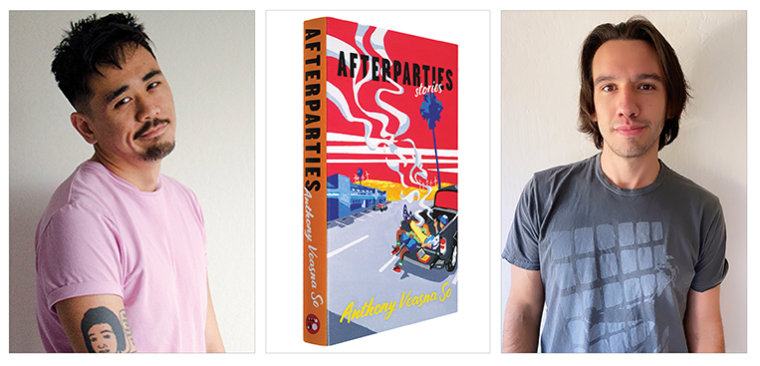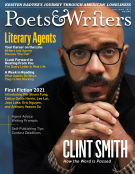When I met Anthony at Stanford in 2014, he declared that he would become a famous fiction writer, even though he had never written fiction before, at least not in a serious way. He was the coeditor in chief of Stanford’s humor magazine, the Chaparral, as well as an up-and-coming stand-up comedian, performing in Los Angeles and New York City during the summer of 2013. Setting out to write the very first stories of what would become the collection Afterparties, Anthony simply channeled the dark humor that he had developed onstage into literary fiction. He imagined how his readers would have reacted if each story were performed as a free-wielding stand-up set, each paragraph an extended bit.

The late Anthony Veasna So (left) and his partner Alex Torres. (Credit: Veasna So: Chris Sackes)
As a comedian Anthony had leveraged elaborate stories about his upbringing in Stockton, California, and about his sexual escapades to shed a humorous light on the generational trauma his family had experienced, the Khmer Rouge genocide. Before comedy Anthony had cultivated this darkly absurdist aesthetic through visual art, especially comics and print transfers. In college he reproduced startling photographs of the killing fields and the ruthlessly cruel Cambodian autocrat Pol Pot in bright, vibrant colors to form a tapestry that hung over his bed. Anthony was a master at hiding trauma in plain sight, usually by encouraging others to uncomfortably laugh it off, like when he made me guess what type of Asian he was on our first date.
Biting sarcasm and absurd plotlines give Anthony’s fiction a lighthearted touch, prompting the reader to, at times, suddenly forget about the tragic political upheaval that brought a generation of Cambodian refugees to California and made his book’s existence possible. The humor in his stories, he hoped, would give people an opportunity to think about sex, drug use, unexpected loss, generational trauma, and other topics usually deemed inappropriate for discussion outside of our closest circles—and sometimes even with ourselves. Anthony was interested in how a character’s responses to anxiety, depression, mania, paranoia, and boredom could drive them to unexpected actions that might alter the course of their lives. Above all he wanted to write a book that treated children, teenagers, and young adults as complex humans with a wide range of emotions, desires, and thoughts—all the human detritus as easily recognizable as it is inevitably shoved under the rug.
Seeing himself as a queer Cambodian American writer, Anthony distanced his work from the melancholia he felt to be so present in Asian American literature because he thought that the Cambodian American experience was so distinct that it required an aesthetic of its own, one that built off of the longer historical tradition of British, Irish, and American literature, even as it departed from it. Anthony learned how to write literary fiction by mastering the art of close reading, a practice that was inspired by his vexed relationships with Susan Sontag’s essay “Against Interpretation” and Eve Sedgwick’s essay “Paranoid Reading and Reparative Reading, or, You’re so Paranoid, You Probably Think This Essay Is About You.” As English majors at Stanford in 2014 and 2015, Anthony and I took a number of courses that inspired Afterparties, on topics such as gangster film, comics, the Harlem Renaissance, and narrative theory. Anthony was particularly moved by the words of Robert Lowell, Nella Larsen, William Blake, T. S. Eliot, Jane Austen, Maxine Hong Kingston, Langston Hughes, and Eavan Boland.
During his time at Stanford and Syracuse, Anthony also deepened his interest in literary theory, postmodernism, philosophy, and queer theory. When he read books like Sianne Ngai’s Ugly Feelings (Harvard University Press, 2005) and Lauren Berlant’s Cruel Optimism (Duke University Press, 2011), he thought about how he could reverse engineer his stories so that each one dovetailed with one of their theories. Other major influences include the thinking of writers straddling the line between modernism and postmodernism—writers like Kurt Vonnegut, Samuel Beckett, and James Joyce. Anthony was intrigued by the absurdity and randomness of their aesthetic choices and how those choices could be interpreted as a response to ongoing traumatic events like war and settler colonialism.
As Anthony was becoming a fiction writer, he was also coming out of the closet and coming to terms with his queer identity, which he kept to himself until he was twenty-one. Throughout his writings he incorporated the ideas of queerness he encountered in Frank O’Hara’s poetry, José Esteban Muñoz’s queer theory, William Burroughs’s fragmented prose, and Samuel Delany’s erotic science fiction. For Anthony, queerness was not a rebellion against form, but a subtle revolution from within it. Like Emily Dickinson’s poems, which influenced Anthony’s silly but dark sense of humor, Anthony’s stories are astonishingly conventional yet startlingly experimental—the happy result of his soldering the English literary tradition to a queer Cambodian American aesthetic.
Because he was balancing ideas from literature, visual art, comedy, philosophy, queer theory, and film, Anthony was a painfully slow writer. In the early days of writing Afterparties, Anthony would agonize over each word—and he would do this again and again as he revised stories for friends, workshops, and finally for the book’s publication. Even after Anthony’s stories were published in places like Granta, the New Yorker, and n+1, he felt compelled to keep revising, as if he could always find a better word or superior sentence structure. Anthony loved writing fiction, but his long-term goal was to transform his stories into genre-bending Asian American films and TV shows. His TV and film influences were far-flung and always funny, at least if you got the punch line and cultural context. 30 Rock, The Sopranos, Girls, Looking, Moonlight, Get Out, Atlanta, and Gone Girl are just a small sampling of the works that directly influenced Anthony while he was writing Afterparties. Nor was TV merely inspiration; he was already brainstorming how to turn his finished stories and unfinished novel into scripts.
In addition to his influences in lowbrow visual culture—from pornography to daytime TV shows such as Family Matters and Full House—Anthony admired TV series without a person as the central character. He took note of how the Netflix series Easy turned the city of Chicago into a character of its own, and how The Good Fight, a spin-off of The Good Wife, captured the absurdity of an Obama-era cast living under the Trump regime, minus the original show’s titular character, Alicia Florrick. Anthony’s TV obsession assisted him, too, with imagining how his nine stories formed a linked collection in the spirit of Jennifer Egan’s A Visit From the Goon Squad (Knopf, 2010), with characters, settings, and motifs reappearing and disappearing in a way that forces us to imagine who the characters may have become and what they’ve lost along the way.
![]()
In February 2017, Anthony was accepted to Syracuse University’s MFA program. He applied with an early draft of “Maly, Maly, Maly,” which the Paris Review would publish after Anthony’s death on December 8, 2020.
Anthony’s professional career took off after taking a course on memoir with Mary Karr, the poet-memoirist who introduced him to n+1. As the story goes, Anthony rolled off of the bus from Syracuse and became friends with the magazine on a frigid February day in 2018, the year that n+1 published his story “Superking Son Scores Again.” That story, which was inspired by sitting in on his older sister’s high school badminton practices, caught the attention of a number of editors and publishers and led to Anthony meeting his agent and other editors. He pitched the story as the Cambodian American Sandlot. With n+1, Anthony published another story, “The Monks,” as well as two essays, one critiquing the film Crazy Rich Asians, and another on his friend’s suicide, grief, and the band Pavement.
Anthony generated more buzz when his short story “Three Women of Chuck’s Donuts” was published in the New Yorker in February 2020. The story, which he revised over six years, began as flash-fiction stories centered around an arrogant James Bond–obsessed, Silicon Valley–based artist. He read an excerpt for San Francisco’s Quiet Lightning reading series in 2017 at the pub Edinburgh Castle.
A few weeks after “Three Women of Chuck’s Donuts” was published, Anthony ventured from San Francisco to New York City, where he met with editors from Random House, Graywolf, and a good number of other publishing houses. Afterparties and Straight Thru Cambotown, his unfinished novel, formed a two-book deal that prompted a six-way bidding war. Ecco Press, an imprint of HarperCollins, won with a six-figure offer that immediately stirred interest in the film industry. The book Anthony wished he’d read in high school or college, Afterparties is a singular contribution to both queer and Asian American literature, and the ideas of race, family, friendship, sexuality, desire, trauma, and humor will make the collection an instant classic. Anthony’s stories will enchant, puzzle, and inspire readers of all backgrounds for generations to come—each story demanding to be read again and again so as to unravel the genius of his singular artistic vision.
Alex Torres is a San Francisco–based writer. He is currently working on a collection of short stories and a novel.








